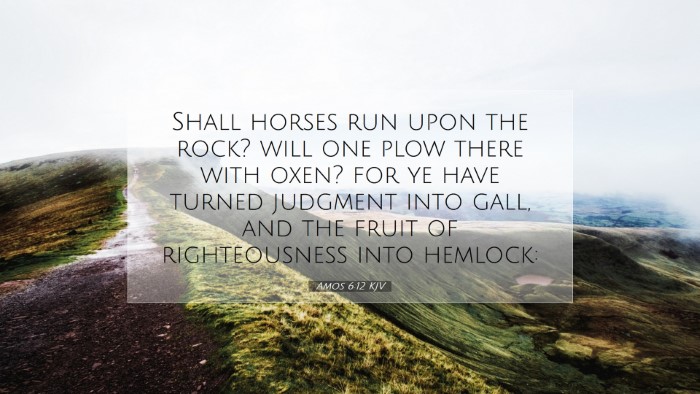Old Testament
Genesis Exodus Leviticus Numbers Deuteronomy Joshua Judges Ruth 1 Samuel 2 Samuel 1 Kings 2 Kings 1 Chronicles 2 Chronicles Ezra Nehemiah Esther Job Psalms Proverbs Ecclesiastes Song of Solomon Isaiah Jeremiah Lamentations Ezekiel Daniel Hosea Joel Amos Obadiah Jonah Micah Nahum Habakkuk Zephaniah Haggai Zechariah MalachiAmos 6:12
Amos 6:12 KJV
Shall horses run upon the rock? will one plow there with oxen? for ye have turned judgment into gall, and the fruit of righteousness into hemlock:
Amos 6:12 Bible Commentary
Amos 6:12 - Commentary and Insights
Amos 6:12 states, "Shall horses run upon the rock? will one plow there with oxen? For you have turned judgment into gall, and the fruit of righteousness into hemlock."
This verse serves as a poignant address concerning the distorted practices of Israel, illustrating the futility of attempting to cultivate righteousness in a context devoid of true justice.
Contextual Understanding
The book of Amos emerges from the Northern Kingdom of Israel during a time of relative prosperity but moral decay. Amos, a shepherd and fig farmer, speaks boldly against the injustices he observes. The overarching theme is God's impending judgment due to the corruption of the nation's leaders and the complacency of the people.
Exegetical Insights
Literal Analysis
The rhetorical questions posed in Amos 6:12 illustrate the absurdity of expecting righteousness (symbolized by plowing) in a context that is as inhospitable to life-giving produce as the rocky ground. This image challenges the Israelites to rethink their reliance on superficial piety while ignoring systemic injustice.
Symbolism
The "rock" symbolizes a harsh environment—indicative of the hearts of the people who have abandoned God's ways. In contrast, the "oxen" represent strength that is misdirected when the conditions for growth and productivity are absent.
Thematic Exploration
This verse dives deep into the weighty matters of justice and righteousness. The transformation of judgment into gall (bitterness) and righteousness into hemlock (poisonous plant) showcases a severe deterioration of moral clarity.
Emphasis on Justice
Both Matthew Henry and Adam Clarke emphasize how true justice springs from God's nature and should permeate His people's lives. The perversion mentioned is not merely a social failure but a profound failure to embody God's character.
The Dangers of Complacency
Albert Barnes notes that the Israelites had become so enmeshed in their comfortable existence that they failed to recognize the severity of their transgressions. This passage serves as a warning against complacency—a spiritual blindness that leads to moral apathy.
Theological Implications
The concerns raised in this verse are not merely historical but resonate with contemporary issues regarding justice and righteousness in the Church and society. The church today is called to examine whether its practices align with God's standards of justice.
Application for Believers
- Self-Examination: Believers should regularly assess their lives in light of God's Word to avoid the pitfalls of complacency.
- Advocacy for Justice: The Church is mandated to stand for justice, voicing compassion for the marginalized and oppressed.
- Restoration: A call to repentance is crucial, as believers are encouraged to seek God’s forgiveness and align their lives with His righteousness.
Conclusion
Amos 6:12 is a clarion call to God's people, urging a departure from empty religiosity toward a vibrant, justice-oriented faith. Reflecting on this verse can provide a means for pastors, theologians, and scholars to reevaluate the importance of upholding God's standards of justice in both personal and communal contexts. As such, whether in study, sermon preparation, or daily application, Amos challenges us—can righteousness justly thrive amidst the rocks of our own complacency?


